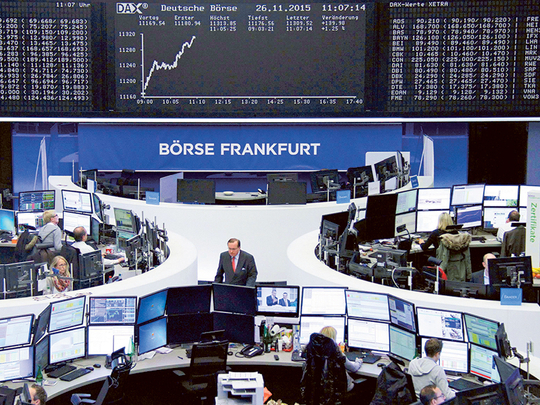
London: European bond traders have been waiting for this moment for the past five weeks.
Since European Central Bank President Mario Draghi said policymakers would re-examine the scope of their stimulus measures at their December 3 meeting, investors have pushed bond yields to record lows from Finland to Italy. The yield on about one-third of the region’s bonds haven fallen below zero in anticipation of the decision and bonds with maturities as far out as 2020 now yield less than the ECB’s minus 0.2 per cent deposit rate.
“Front-end yields are reflecting expectations that next week they do cut the deposit rate,” Mike Amey, a London-based money manager at Pacific Investment Management Co, said in an interview on Bloomberg Television’s “Surveillance” with Jonathan Ferro and Tom Keene. “We’re probably going to see the ECB lower official interest rates again, probably raise the amount of assets they’re buying either over the time frame or on the monthly purchases.”
Germany’s two-year yield dropped three basis points, or 0.03 percentage point, in the week to minus 0.42 per cent at the 5pm close in London on Friday. The zero per cent security due in December 2017 rose 0.05 or 50 euro cents per €1,000 (Dh3,891, $1,060) face amount, to 100.855. The nation’s five-year note yield dropped to as low as minus 0.207 per cent, below the current deposit rate for the first time.
Negative yields
While ECB policymakers have so far pledged to buy at least €1.1 trillion of assets, they are still seeking a silver bullet to push price growth toward the central bank’s target of just under 2 per cent. Economists surveyed by Bloomberg predict that a flash estimate published on December 2 will show inflation rose 0.3 per cent in November.
Negative-yielding securities now total $2.2 trillion, or around one-third of the Bloomberg Eurozone Sovereign Bond Index. That compares with $1.38 trillion before Draghi’s October 22 pledge.
The deposit rate has become a focal point for investors after Draghi said that day that officials discussed a reduction. ECB restrictions currently prevent the central bank from buying any security yielding below the minus 0.2 per cent level so a change to the rate would bolster the number of bonds eligible for purchase.
A 15 basis-point cut is more than 90 per cent priced in, according to futures data compiled by Bloomberg. All but one of 44 economists in a Bloomberg survey forecast a reduction, with the median prediction at minus 0.3 per cent. Banks including Commerzbank AG and Citigroup Inc., are also calling for the for the ECB to extend or expand its bond-buying plan next week.












